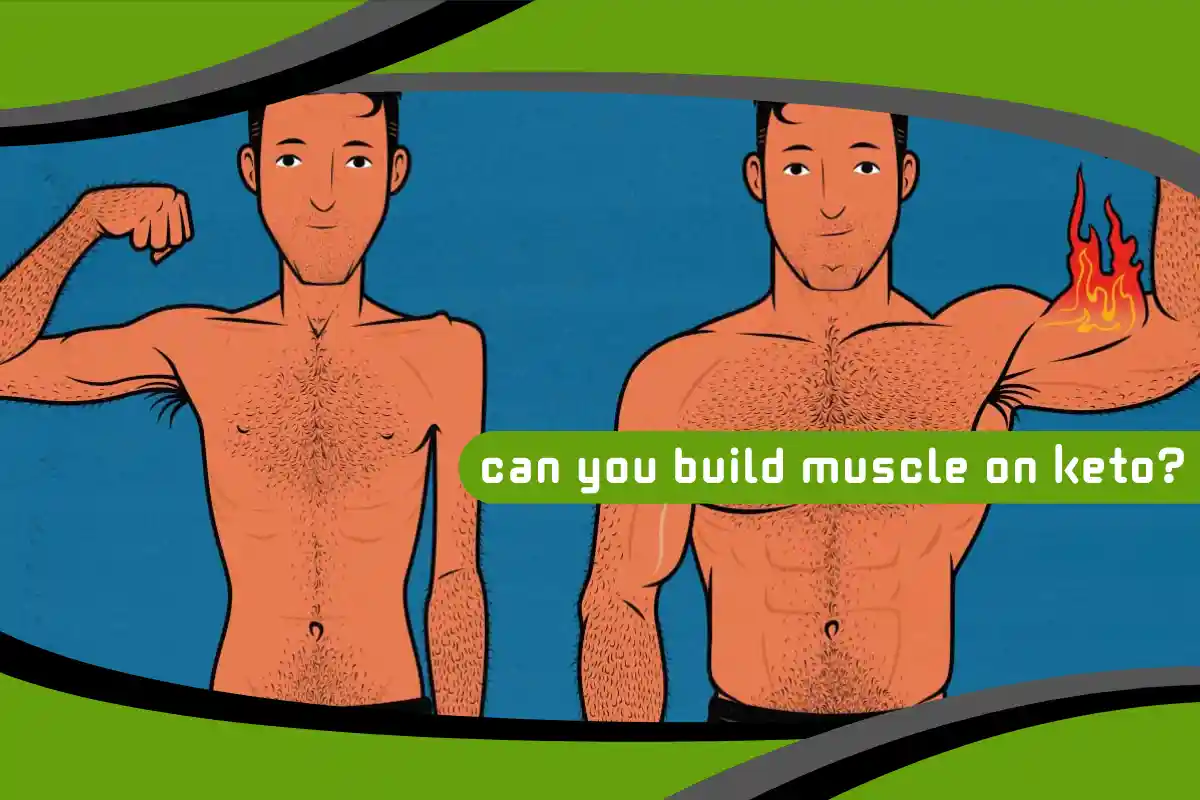The ketogenic diet, widely known for its fat-burning potential, has traditionally been associated with weight loss rather than muscle gain. But what if you want to build muscle without abandoning your low-carb lifestyle? The truth is, while building muscle on keto is more complex than on a traditional high-carb diet, it’s absolutely possible. With strategic planning, a deep understanding of macronutrient needs, and an individualized approach, keto can be adapted for muscle-building purposes without sacrificing the metabolic benefits it offers.

Understanding Muscle Growth Mechanisms
To build muscle, your body needs to undergo a process called hypertrophy, which is stimulated by resistance training and supported by adequate nutrition. The two critical nutritional components are sufficient protein and a caloric surplus. Carbohydrates play a role in muscle recovery and glycogen replenishment, but they are not strictly required for muscle synthesis itself. Instead, as long as amino acids are present and insulin levels rise slightly post-meal, the anabolic process can still be activated—even in ketosis.
Watch also: How to Get Rid of Keto Rash Fast: Causes, Symptoms, and Proven Solutions
The Role of Protein on a Ketogenic Diet
Protein is the cornerstone of muscle building. On a ketogenic diet, protein intake should be optimized but not excessive, to avoid being kicked out of ketosis due to gluconeogenesis. Generally, 1.6 to 2.2 grams of protein per kilogram of body weight is a suitable range for muscle growth on keto. This ensures the body has enough raw material to repair and build muscle tissue, especially after strength training sessions.
Why Carbs Are Not Essential for Muscle Growth
Contrary to popular belief, carbohydrates are not a prerequisite for muscle growth. The body can adapt to using ketones and fat for fuel, even during resistance training. While glycogen stores may be lower on keto, fat-adapted individuals rely on alternative pathways for energy. With time, athletes can train at high intensities without the typical dependence on glucose. As long as overall energy and protein needs are met, muscle growth can still occur in a low-carb environment.
Using Ketones for Training Energy
When you’re fully keto-adapted, your body becomes highly efficient at oxidizing fat and using ketones as a primary energy source. This metabolic shift supports long training sessions and can provide a steady stream of energy without the crashes often seen with carb-based fueling. While ketones may not offer the same explosive energy as glucose, they support endurance and stable performance—two key components for building muscle over time.
Strategic Use of Targeted Keto
Some athletes choose a targeted ketogenic diet (TKD), which allows for small amounts of carbohydrates around workouts. This approach provides a temporary glycogen boost while maintaining ketosis most of the time. For example, consuming 25-50 grams of fast-digesting carbs 30 minutes before training can enhance performance and recovery without disrupting fat adaptation. This hybrid model can be especially useful for bodybuilders and strength athletes looking for an edge.
Importance of Resistance Training
No diet alone will build muscle. Resistance training is non-negotiable for hypertrophy. For those on keto, it’s essential to maintain a structured workout plan that includes progressive overload. Compound movements like squats, deadlifts, and bench presses should be emphasized to recruit large muscle groups. When paired with adequate protein and caloric intake, this creates the anabolic environment needed to support muscle development.
Managing Caloric Surplus on Keto
To gain muscle, a caloric surplus is required. On keto, this surplus must come from fat and protein rather than carbs. While it’s easy to overeat carbs, fat is more satiating, which can make achieving a surplus more challenging. Tracking macros is especially important in this case. Focus on calorie-dense healthy fats such as olive oil, nuts, avocados, and fatty fish to hit your goals without feeling overly full.
Muscle Recovery and Inflammation Control
One advantage of the keto diet is its anti-inflammatory effects, which may enhance recovery. Reduced inflammation means less soreness and potentially quicker muscle repair. Keto also stabilizes blood sugar, which contributes to more consistent energy and fewer oxidative stress spikes. These factors can improve training frequency and quality, indirectly supporting hypertrophy over the long term.
Hormonal Impact of Keto on Muscle Growth
Hormones play a major role in muscle growth. Testosterone, growth hormone, and insulin-like growth factor-1 (IGF-1) are all influenced by dietary intake. Some research shows that prolonged keto may slightly reduce IGF-1, but this can be offset by resistance training and adequate protein. More importantly, keto tends to improve insulin sensitivity and stabilize testosterone levels, both of which are supportive of muscle-building goals.
Supplements That Support Muscle Gain on Keto
Supplements can enhance results on keto, especially when building muscle. Creatine is one of the most researched and effective supplements for strength and mass gain. Electrolytes are also crucial on keto, particularly sodium, potassium, and magnesium, which support performance and recovery. Branched-chain amino acids (BCAAs) may also be useful around training to provide additional fuel without disrupting ketosis.
Timing Your Meals for Muscle Growth
While nutrient timing isn’t everything, it becomes more important when trying to build muscle on a restrictive diet. Consuming protein and some fat within an hour after your workout helps with muscle repair. Those following a targeted keto plan might also benefit from a pre-workout carb and post-workout protein combination. Ultimately, consistency and overall daily intake matter more than perfect timing, but smart planning adds an extra edge.
Ketogenic Diet and Body Composition
One of the underrated benefits of building muscle on keto is the positive impact on body composition. Keto helps preserve lean mass during fat loss, and when in a surplus, it promotes lean muscle gains with minimal fat accumulation. This makes it ideal for body recomposition goals. Individuals can achieve a muscular, defined physique without the bulkiness often associated with high-carb bulking.
Watch also: What to Eat at Restaurants on Keto: The Ultimate Guide to Low-Carb Dining Out
Adapting Workouts for a Low-Carb State
Training while in ketosis may require some modifications. It’s common to experience reduced performance during the adaptation phase, but this improves over time. Higher reps and moderate intensity work better initially, gradually progressing to heavier lifts as energy systems adapt. Tracking progress and listening to your body is key during this transitional period.
Psychological Benefits of Keto for Lifters
The mental clarity and mood stability reported on keto can positively affect training adherence. When you feel sharper and less fatigued, motivation to train and stick to your goals increases. This cognitive edge can help sustain the discipline needed to maintain consistency in both diet and training, which are critical for long-term muscle development.
Addressing Keto Myths in Muscle Building
Many myths suggest keto is only good for fat loss, not muscle gain. This misconception stems from the outdated belief that carbs are essential for anabolism. As we’ve explored, while carbs can enhance performance, they are not required. When done correctly, keto offers a unique metabolic state that supports muscle growth and fat burning simultaneously.
Individual Variability and Muscle Response
Everyone responds differently to dietary changes. Some individuals thrive on keto for muscle building, while others may struggle. Factors such as genetics, training history, and metabolic flexibility all play a role. It’s important to experiment, track progress, and adapt your approach based on real-world results rather than rigid theories.
Monitoring Progress on a Keto Bulk
Gaining muscle on keto often occurs at a slower, more controlled pace compared to carb-based bulking. This can be an advantage, as it minimizes fat gain. Regularly tracking weight, measurements, strength levels, and progress photos will help you gauge success. Patience is key, as quality muscle gain takes time, regardless of the diet.
Keto and Long-Term Athletic Performance
For endurance athletes and recreational lifters alike, keto can be a sustainable long-term solution. While peak power may be slightly reduced compared to high-carb diets, endurance, recovery, and metabolic health often improve. These factors contribute to consistent training, which ultimately supports continuous muscle growth over time.
Final Thoughts: Yes, You Can Build Muscle on Keto
The short answer is yes—building muscle on a ketogenic diet is entirely possible. It requires a strategic and well-informed approach, with careful attention to training, protein intake, and overall energy balance. For those committed to the keto lifestyle, muscle growth is achievable without compromising the principles of low-carb living.



No comment